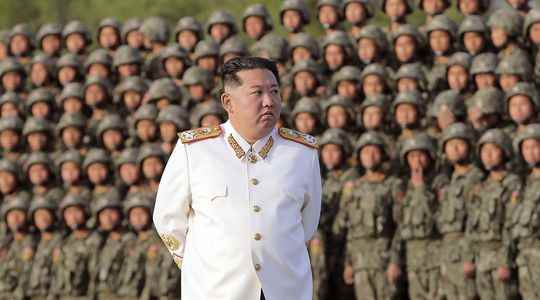On April 25, Kim Jong-un, dressed in white, was cheered by thousands of North Koreans during the celebrations of the 90th anniversary of the creation of the North Korean people’s army. Officially, the country was still one of the only countries in the world to be spared from the Covid 109 pandemic. Two weeks later, on May 12, the “supreme leader” appears publicly with a mask, and declares the generalized confinement of the territory. after the discovery of the Omicron variant in Pyongyang. The first deaths are announced the next day by state media.
A “malignant disease” caused “a great upheaval” in the country, admitted Kim Jong. If the authorities are reluctant to pronounce the name of Covid 19, the official KCNA agency acknowledged on Sunday May 19 that 820,620 suffered from “fever” (of which at least 324,550 are under medical treatment) and that 42 people had died. Without sufficient screening capacity, it is impossible to accurately assess the health situation, but these estimates suggest that the coronavirus could spread rapidly within a population as fragile as the North Korean public health system.
“From the end of April, people suffered from fever, while there was a large-scale epidemic wave in the Chinese neighbor, underlines Cheong Seong-chang, director of the center for North Korean studies at the Sejong institute in Seoul. But North Korea was too confident in its ability to resist the virus: during the parade many people were mobilized, which must have contributed to spreading the virus quickly.“
Campaigns even more in danger
“Poverty, the absence of vaccines and the chronic lack of resources mean that the local population is at a higher risk of the virus, warns Sokeel Park, leader in South Korea of the NGO Liberty in North Korea. Without beds resuscitation or drugs, the health system is also unable to treat the most vulnerable.
The health situation is worrying for the 2.5 million inhabitants of Pyongyang already confined since May 10, according to the specialized site NK news. But the inhabitants of the countryside seem much more in danger. “There are huge deficiencies in training as well as in resources, explains a humanitarian customary in the missions in the North. The gap between the capital and the rest of the country is huge on all counts.”
Outside the big cities, confinement seems impossible. “If they close all the markets in the countryside, how can people eat? Two-thirds of the basic food resources come from the markets, recalls Andrei Lankov, professor at Kookmin University in Seoul. Not to mention that North Korea is currently going through a key period, that of rice transplanting: it is therefore difficult to completely isolate agricultural workers. On Thursday, the American agency Associated Press also reported having been able to see that farmers were at work outside.
Mass starvation or a deadly epidemic wave: the equation seems insoluble for the regime. As strict as North Korea’s zero covid policy will be, the Chinese example demonstrates that restrictions are not enough to stop the more contagious Omicron variant. Without treatment or vaccines to limit the lethality of the virus, North Korea can only postpone the peak of the epidemic and the humanitarian catastrophe that may accompany it.
The issue of foreign aid
“The fact that they communicate openly showing that the situation is serious can be interpreted as a sign that they are looking for foreign aid, analyzes Andrei Lankov, They are probably not looking for a few million doses, but of the quantity needed to vaccinate the 25.7 million inhabitants. Sinovac and AstraZeneca proposed respectively by China and the international mechanism Covax have been refused by North Korea since the start of the epidemic. The Pfizer BioNTech and Moderna vaccines would be a option, but without a refrigeration system, it would be impossible to transport 50 million doses to North Korea.This would therefore require international intervention and the presence of foreign workers on North Korean territory: difficult to imagine in the current circumstances.
The new South Korean President Yoon Suk-yeol, rather known for his hostility towards Pyongyang, has indicated that his country is ready to help the neighbor on the vaccine front. But will this offer be able to hold up in the face of the deterioration of the security situation between the enemy brothers? “All signs show that the North Koreans will soon carry out their 7th nuclear test, says Professor Sung-wook Nam, a former analyst for the South Korean intelligence services. Recent satellite images attest to the probability of what would be experienced as a major provocation by Seoul as in Washington. “When the people are depressed, the regime needs a sensational event to stimulate patriotic fervor” points out Cheong Seong-chang. visibly more concerned with its survival than that of its inhabitants.
